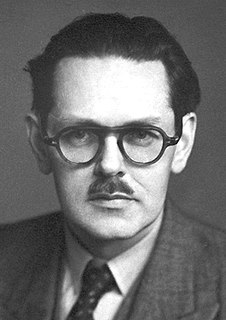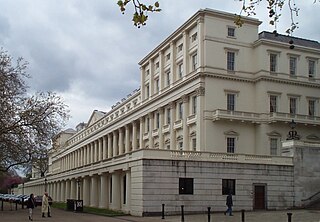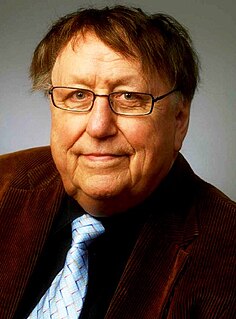Related Research Articles

William Howard Stein was an American biochemist who collaborated in the determination of the ribonuclease sequence, as well as how its structure relates to catalytic activity, earning a Nobel Prize in Chemistry in 1972 for his work. Stein was also involved in the invention of the automatic amino acid analyzer, an advancement in chromatography that opened the door to modern methods of chromatography, such as liquid chromatography and gas chromatography.

Archer John Porter Martin was a British chemist who shared the 1952 Nobel Prize in Chemistry for the invention of partition chromatography with Richard Synge.

The Leverhulme Medal is awarded by the Royal Society every three years "for an outstandingly significant contribution in the field of pure or applied chemistry or engineering, including chemical engineering". It was created in 1960 after a donation by the Leverhulme Trust to mark the 300th anniversary of the foundation of the Royal Society, and is accompanied by a £2000 gift. Since its creation, it has been awarded 21 times, and unlike other Royal Society medals such as the Royal Medal, it has never been awarded to the same person multiple times. Citizens of the United Kingdom have won the medal 19 of the 21 times; the two foreign recipients have been Man Mohan Sharma, an Indian citizen who was awarded the medal in 1996 "for his work on the dynamics of multi-phase chemical reactions in industrial processes", and Frank Caruso, an Australian chemical engineer, awarded the medal in 2019. Two Leverhulme Medal winners have also won the Nobel Prize in Chemistry: Archer John Porter Martin, who won the medal in 1963 for "his distinguished and fundamental discoveries in chromatography and its application" and the Nobel Prize in 1952, and Cyril Norman Hinshelwood, who won the medal in 1960 for "his outstanding contributions to physical chemistry" and the Nobel Prize in 1956. Anne Neville became the first woman to receive the award in 2016.

The NASA Exceptional Scientific Achievement Medal was established by NASA on September 15, 1961, when the original ESM was divided into three separate awards. Under the current guidelines, the ESAM is awarded for unusually significant scientific contribution toward achievement of aeronautical or space exploration goals. This award may be given for individual efforts that have resulted in a contribution of fundamental importance in this field, or have significantly enhanced understanding of this field.

The Corday–Morgan Medal and Prize is awarded by the Royal Society of Chemistry for the most meritorious contributions to experimental chemistry, including computer simulation. The prize was established by chemist Gilbert Morgan, who named it after his father Thomas Morgan and his mother Mary-Louise Corday. From the award's inception in 1949 until 1980 it was awarded by the Chemical Society. Up to three prizes are awarded annually.
Partition chromatography theory and practice was introduced through the work and publications of Archer Martin and Richard Laurence Millington Synge during the 1940s. They would later receive the 1952 Nobel Prize in Chemistry "for their invention of partition chromatography".

Erika Cremer was a German physical chemist and Professor Emeritus at the University of Innsbruck who is regarded as one of the most important pioneers in gas chromatography, as she second conceived the technique in 1944, after Richard Synge and Archer J.P. Martin in 1941.

OpenChrom is an open source software for the analysis and visualization of mass spectrometric and chromatographic data. Its focus is to handle native data files from several mass spectrometry systems, vendors like Agilent Technologies, Varian, Shimadzu, Thermo Fisher, PerkinElmer and others. But also data formats from other detector types are supported recently.

Klaus Mosbach is a Swedish biochemist. He is now professor emeritus at the department of pure and applied biochemistry of Lund University. He founded the Center for Molecular Imprinting in Lund, Sweden,. He has also been co-founder of the Institute of biotechnology at ETH Zurich Switzerland 1982,. He is a great visionary who gave shape to the modern era of Molecular imprinting for which he has been awarded the plaque at the international meeting of molecular imprinting in 2010 in New Orleans, United States of America.
Milton L. Lee is the H. Tracy Hall Professor of Chemistry at Brigham Young University (BYU).
Leslie Stephen Ettre was a Hungarian-American analytical chemist and scientist who was known for his contributions to the field of chromatography, in particular open-tubular gas chromatography, as well as to documentation of the history of chromatography.
The Tilden Prize is an award that is made by the Royal Society of Chemistry for advances in chemistry. The award was established in 1939 and commemorates Sir William A. Tilden, a prominent British chemist. The prize runs annually with up to three prizes available. Winners receive £5000, a medal and certificate.
The Beilby Medal and Prize is awarded annually to a scientist or engineer for work that has exceptional practical significance in chemical engineering, applied materials science, energy efficiency or a related field. The prize is jointly administered by the Institute of Materials, Minerals and Mining, the Royal Society of Chemistry and the Society of Chemical Industry, who make the award in rotation.
Walter Goodrich Jennings was an American chemist, educator and entrepreneur. He was co-founder of J&W Scientific, which became the world's largest supplier of fused silica columns; the company was purchased by Agilent Technologies in 2000.
Centrifugal partition chromatography is a special chromatographic technique where both stationary and mobile phase are liquid, and the stationary phase is immobilized by a strong centrifugal force. Centrifugal partition chromatography consists of a series-connected network of extraction cells, which operates as elemental extractors, and the efficiency is guaranteed by the cascade.
The Centenary Prize is an award granted annually by the United Kingdom-based Royal Society of Chemistry (RSC) to up to three "outstanding chemists, who are also exceptional communicators, from overseas".
Robert (Bob) Kennedy is an American chemist specializing in bioanalytical chemistry including liquid chromatography, capillary electrophoresis, and microfluidics. He is currently the Hobart H. Willard Distinguished University Professor of Chemistry and the Chair of the Department of Chemistry at the University of Michigan. He holds joint appointments with the Department of Pharmacology and Department Macromolecular Science and Engineering. Kennedy is an Associate Editor of Analytical Chemistry.
References
- ↑ "Martin Medal". ChromSoc.
- ↑ "About". ChromSoc.
- ↑ "The Nobel Prize in Chemistry 1952". NobelPrize.org.
- ↑ "List of The Chromatographic Society Medal Winners" (PDF). ChromSoc. Retrieved 18 December 2019.